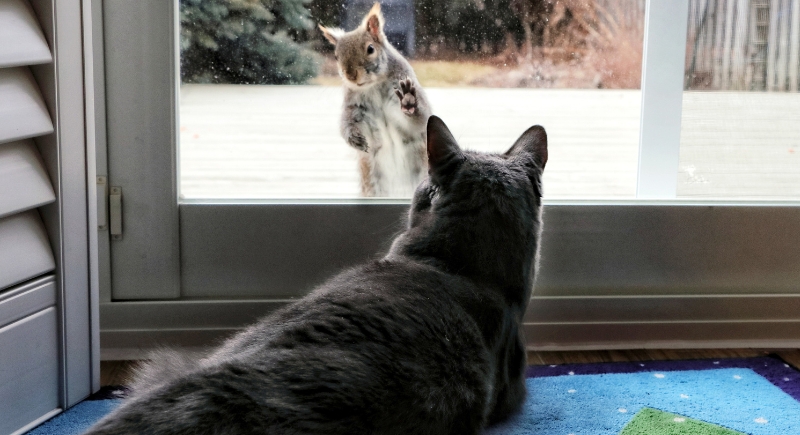There’s a Creepy Reason Why Some Squirrels Are Obsessed With Cats
A viral video shows a squirrel curling up beside an orange cat. It feels warm until you know what’s behind it. That adorable squirrel is probably infected with a microscopic parasite called Toxoplasma gondii. This little organism has a dark talent for changing animal behavior, and it’s not doing it for fun; it’s doing it to survive.
Toxoplasma gondii has one big goal: to end up inside a cat. Cats are the only animals in which the parasite can reproduce, so it manipulates other animals, such as rodents like squirrels, to help it spread. Instead of running for their lives when a cat shows up, infected squirrels start to act strangely calm.
Some even seem drawn to the smell of cat urine. What appears to be bravery is often a result of brain hijacking. The parasite tweaks its instincts so that they wander close enough to be caught and eaten, completing its life cycle inside the cat’s body.
A Parasite With Serious Influence

Image via iStockphoto/EyeEm Mobile GmbH
Researchers at the University of California, Riverside, found that Toxoplasma gondii can mess with the brain’s communication system even when it infects just a few neurons. It interferes with the way brain cells send signals to each other, particularly between neurons and glial cells that help maintain balance.
Professor Emma H. Wilson, who led the study, explained that this disruption changes how chemicals like glutamate are managed in the brain. When this system goes haywire, it can lead to overstimulation and even seizures.
Here’s where it gets wild: up to 30% of people in the United States carry this parasite, usually without knowing it. Most infections happen from eating undercooked meat or handling cat litter. For healthy people, it often stays dormant. However, in individuals with weakened immune systems, it can become active and cause a serious illness. Scientists believe the parasite may also have subtle effects on human behavior and mood, although further research is needed to confirm this.
The Science Behind The Mind Trick
In their study, Wilson’s team found that infected neurons release fewer extracellular vesicles, also known as EVs. These are tiny packets that cells use to send information. When EV signals drop, astrocytes —the brain’s support cells —cannot perform their job properly. Normally, they control neurotransmitters like glutamate to prevent neurons from overfiring. But once the parasite interrupts this flow, brain chemistry starts to change. This can alter behavior, decision-making, and risk-taking, which explains why those infected squirrels start playing with their predators instead of hiding from them.
The same disruption may also happen in humans. Though most people never show symptoms, the parasite’s ability to change brain signaling has sparked years of debate about its possible connection to neurological and behavioral disorders. Scientists are exploring whether blood tests can pick up signs of Toxoplasma gondii infection through EVs, which could make diagnosis much easier.
Staying Safe And Informed

Image via iStockphoto/Okssi68
You don’t need to panic or give your cat away. Most infections are harmless if your immune system is strong. Still, prevention matters. Cook meat thoroughly, wash vegetables before eating them, and wear gloves or wash your hands after cleaning a litter box. Pregnant individuals need to be extra careful since the parasite can cause birth complications if contracted for the first time during pregnancy.
So the next time a squirrel seems a little too chill around your cat, know that it might not be bravery or friendliness. It could be a creepy little parasite pulling the strings. Behind that adorable moment could be one of nature’s most fascinating and unsettling mind-control tricks.